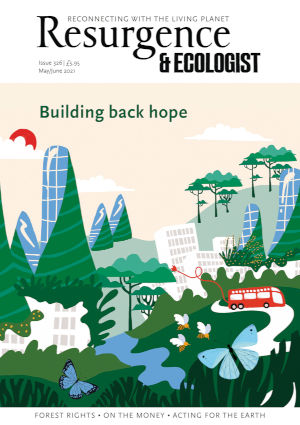While we must resist the burden of seeing everything through the lens of Covid, it seems inevitable that two books that focus in different ways on the question of if and how the economy is designed to maximise human wellbeing will be challenged by a global pandemic that occurred while they were in production.
In a way this is a strength, since the central message of both books – that we urgently need to redesign an economy that has growth as its central mechanism – is likely to find a more sympathetic audience after a year during which fundamental questions of life and death have come at us on a daily basis.
In Exploring Degrowth, Vincent Liegey and Anitra Nelson provide a survey of the academic movement for challenging and reversing economic growth, a movement that has flourished in recent years. It was a curious experience reading an academic ana-
lysis of the political movement I have been part of for three decades, and I was touched and amused in equal measure to see the account of the European Parliament’s first conference on degrowth, held in 2018, which I helped to organise.
What strikes me most strongly from the historical account is how long the movement for degrowth has been developing – since 1972, when French sociologist André Gorz coined the term. It really is well named “the strategy of the snail”. Its slow progress is a result of the powerful vested interests exemplified by the 2010 book Ferraris for All, based around a notion that all 8 billion global citizens might come to live the high-energy lifestyle of the average North American, which thankfully seems absurdly hubristic today.
So if it isn’t a fast car, how do we encapsulate the good life? One of the unquestionable benefits of growing older is that history is actually part of your life. So I can remember the 1970s as a time of extremely low standards of taste and hygiene but an extraordinary sense of empowerment and freedom. It doesn’t surprise me in the least to know that the peak of the index for sustainable welfare (one of the measures proposed to replace GDP growth) occurred in around 1976 despite people having access to far fewer consumer goods.
Which brings us to the question of finding satisfaction with lower material wealth proffered by Kate Soper, a philosopher whose book gives a deeper analysis of “alternative hedonism” and “consumption’s troubled pleasures”. She draws on Marxist analysis with regard to the economy, critiquing in particular the way capitalism has normalised an ethic of consumption that is inimical to our long-term survival, and is well placed to critique the failure of most Marxist and socialist economists to evolve beyond the traditional understanding of work, even an idealisation of work. Her suggestion of cutting the link between survival and labour while reimagining a future place for craft will be well received by many readers of Resurgence & Ecologist.
Soper applies her concept of alternative hedonism to “transport, leisure and stuff”. So, how might we develop this new ethic of consumption in the face of an advertising industry informed by powerful psychological understanding and fuelled by corporate cash? Soper gives us the example of Ireland, and its history of following a conventional view of progress imposed by the British coloniser, a trajectory deplored by Irish writers including Joyce and Yeats. In place of this derived and ultimately unsatisfying model of economic prosperity she proposes “something of the ideal of sober consumption and spirituality which the defendants of the traditional ways of life in the colonized nation sought to put against the materialism and commercializing values of the colonizer”. Thus, establishing an alternative hedonism is an emancipatory project following decades of colonisation by the advertising industry and corporate marketing.
While I applaud Soper’s attempt to not just interpret the world but sketch out a way to change it, I find her political analysis less convincing. While acknowledging the leading role played by Green parties around the world to challenge unsustainable consumption, she sees the British Labour party as central to any political change. A vantage point from other European countries where Greens in coalition governments are already constraining aviation and implementing circular economies might have given readers more hope.
While the insights and experiences shared in both books would provide an invaluable education for many who have only recently begun to consider the climate and ecological crises, they fail to grapple with the two issues that really block progress: the technical issue of how the design and functioning of the global capitalist system is inextricably linked with growth; and the political issue of tackling the vested interests that are doing very nicely out of the world as currently structured, no matter how suicidal it is in the long run.
While encouraging people to risk a deadly disease and to produce CO2 emissions while sitting in their cars seems insane, it makes perfect sense within an economic system that only has two modes: boom and bust. It is this central design flaw of capitalism, and its links to the nature of finance and the need for accumulation, that is driving us to destruction.
While Soper’s book is extremely well written and provides an interesting summary of the impact of post-growth understandings on issues as widespread as work, culture and consumption, it suffers from a problem coming to many such critiques of not understanding the technical functioning of the economy. Soper is a philosopher and so this is not a criticism of her work, but it is a criticism of the many millions of economists the world over who do understand how the economy functions and yet continue to proselytise their supply-and-demand curves rather than examining the implications of the need to end growth on their dismal science.
What does Covid-19 tell us about what really matters? That we should value life and loves above material possessions and hypermobility? If so, the lessons of the pandemic are also the lessons of these books. We can only hope that the citizens especially of the consumptive west will be more willing to heed them in 2021 than they were in 2019.







